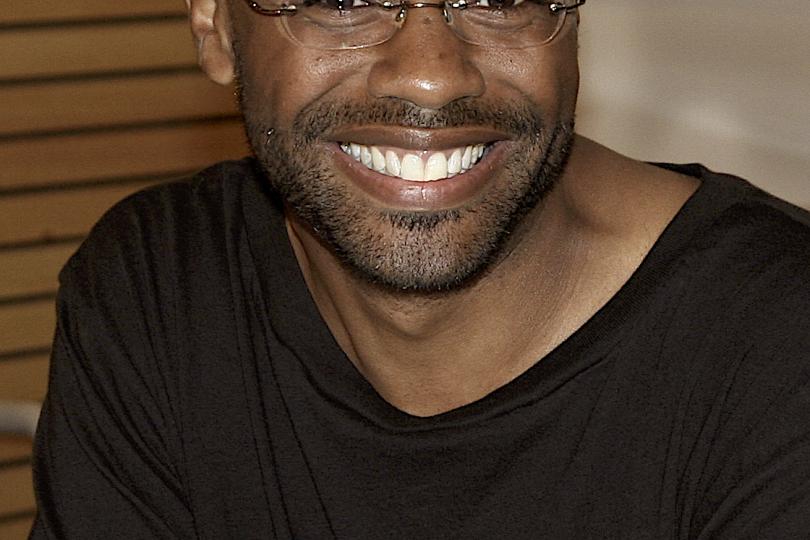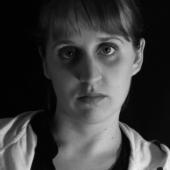Hearing Voices with Harrison David Rivers

Harrison David Rivers has been a fixture at the Playwrights Center, having won the Jerome Many Voices Fellowship, and the McKnight Fellowship, and currently servings as a Core Writer. This spring, I was charmed by a reading of his karaoke-infused play Beneath the Sea & Stars. We spoke by email.
How did you come to playwriting?
I was a performer in high school and college. And then my senior year (during my thesis play actually) I developed crippling stage fright. Suddenly, acting was off the table. I had always written. I’d taken a playwriting class. Written short pieces. Even a musical for my American Studies major, but writing had never seemed like a viable option. I mean, how do you make a living doing that?
After undergrad, I moved to San Francisco. I’d been there for a few months when I started hearing voices, I tried to ignore them, but they were insistent. I started to think that there was something very very wrong with me. So I called my mom. I said, “mom, I’m hearing voices.” And I was sure that she was going to say, “you should come home to Kansas,” (because that’s what my parents usually say when I call them), but instead she said, “have you written down what they’re saying?” And I did. And that became my first full-length play.
How did you come to the Twin Cities? And what made you stay?
I moved to the Twin Cities for a Jerome Many Voices Fellowship in 2014. I moved because Jeremy Cohen told me on the phone that “I was wanted.” I stayed because a just few weeks into my time in the Twin Cities I met my now husband, Christopher.
What's your favorite part of the process of bringing a play to the stage? Is there any part you dread?
I love the first read-thru. And not the one in the rehearsal room, the one where you invite friends to your living room and you buy some bottles of wine and you read the draft. I dread tech.
What's the hardest thing to explain about being a playwright?
Oh God, it’s all hard. I still haven’t figured out how to answer the question, “what kind of plays do you write?”
What's your favorite metaphor for making a play?
I wish there was one metaphor that applied to every play. Each is so different. And the experience of making each is so different. Some of my plays have needed a director from the first line of dialogue. Some I’ve needed to hear aloud before they were complete. Others have needed music or movement. And still others I’ve kept close – almost a secret.
What's the best thing a theater can do for a playwright? What should they keep in mind when approaching a new script?
Pay them! Let them write what they want to write! Read the plays they submit! Email them back when they email you! Every play is the result of hundreds maybe thousands of hours of work, of soul-searching and re-writing – blood, sweat and tears. Be mindful of that.
As a playwright who has lived and worked in different cities, what is something that theaters in the Twin Cities do well?
There is less deification of Artistic Directors in the Twin Cities – thank God.
Theater people in the Twin Cities are real people.
They walk their dogs.
They water their plants.
They order lattes.
They’re accessible – and accessibility is a beautiful thing.
Is there anything that the Twin Cities theater community could be doing differently to support playwrights?
Utilize the Playwrights’ Center.
It should be a priority for all Twin Cities theaters to get to know the local playwrights and to find opportunities to work with them.
It’s great to program work that’s gotten rave reviews in New York City, but wouldn’t it be amazing if Twin Cities theaters were doing world premieres of local writers’ work and launching those plays into the world? If the Twin Cities were known not just for developing new work [by local playwrights], but for producing that work?
And that’s not to say that some theaters aren’t already doing this, some are, but I think it’s a commitment that all Twin Cities theaters should make.
Why should companies do new work?
New work is the lifeblood of the theater.
What do you see as the future of playwriting? (More absurdity, more realism, less text, more talking parrots, etc.)
Oh I don’t know. The world is such an insane place right now. Whatever the future of playwriting looks like or sounds like it will definitely take shape in response to the insanity.
So yes, maybe more talking parrots.
Rivers' new work the bandaged place will be presented in April 2018 at the Playwrights' Center as part of the Ruth Easton New Play Series




